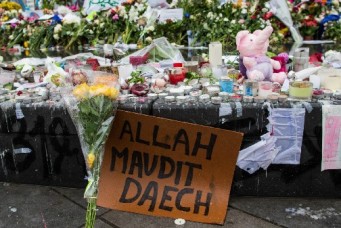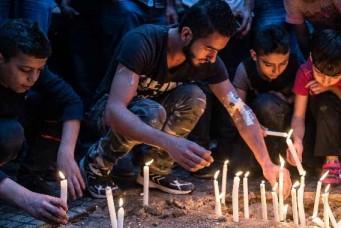Hollande’s War
President Hollande has called for a “merciless struggle” against ISIS. But France’s “war” with the terrorist group began well before Friday’s attacks.

French police patrol the Champs Elysées, Paris, Nov. 15, 2015. Kamil Zihnioglu/AP/Corbis
War… The word is in every official statement, constantly repeated by President François Hollande and Prime Minister Manuel Valls, taken up unanimously—and even with a perverse joy—by the media and their unavoidable “expert panels” skilled in the art of filling airtime.
War, then. Let us concede that it is so. But what kind of war remains far from clear. The French patrie has not been invaded, nor occupied. There is no grand and massive attack, led by enemy cavalrymen or tanks. If there is a war, it is asymmetrical and, apparently, de-territorialized. It pits a country with a well-established army, frontiers and institutions, against an opaque group reigning over a self-proclaimed caliphate with ill-defined borders.
In France, the war has no frontline, but that of a permanent threat and a diffuse fear, with the public authorities unable to guarantee that the killings of Friday, November 13 won’t repeat themselves. In Iraq and Syria, the war is more “classic,” carried on by air forces that bombard without pause enemy positions.
France started this war. President Hollande and his government decided upon war when they intervened militarily against the Islamic State in Iraq and Syria (ISIS) after Mosul’s fall in the summer of 2014. This war, however, was not open to national debate. Parliament did not have to give the green light because the French constitution permits the chief of state to decide by himself.
In theory, the decision to intervene could appear praiseworthy, given the incredible savagery and violence ISIS troops have shown themselves capable of. But is it really France’s problem? Is up to France to interfere with a conflict that even the United States—which is responsible for the chaos in Iraq following the 2003 invasion—treats with extreme caution? Intervention in the name of human rights? Very well then. Why not bomb Boko Haram in Nigeria, or the guerilla movement FARC in Colombia?
Only recently, France became even more deeply involved in this war by bombing ISIS in Syria (helping indirectly, as a result, the regime of Bashar Al-Assad). The attacks of November 13 are only the latest episode in the conflict between France and ISIS. And as in any conflict, the killings, which were the terrorist organization’s response, are far from the last.
Quite plainly, Hollande must explain the reasons behind France’s intervention in Iraq and Syria, and persuade his countrymen that it was not military adventurism driven by domestic political calculations (witness all those obsequious articles praising “Hollande the warrior”). He must also explain why the French people were not sufficiently informed of the real and important risks brought about by a war that was supposedly far away and without consequence.
Before November 13, Hollande should have told the French people that their country was engaged in a war that, sooner or later, would cause human loss within their own national borders. History will remember this double fault: a frivolous and self-interested military adventurism, all the more dangerous as France doesn’t have the means to sustain this war (or to protect itself), and a guilty silence in the face of public opinion.
War then… A war is lost or won. Or a war becomes, like in Orwell’s 1984, remote and permanent. How to win this war? By “exterminating” ISIS, declares the former president of the French Republic Nicolas Sarkozy. Very well then. Let’s suppose that the reasons for France’s involvement have been properly discussed, and it is impossible to do nothing and turn the other cheek. ISIS must pay for its crimes.
But how do we defeat them? How do we exterminate them? How do we so without an even worse monster emerging from the ashes? And who can believe that we can defeat and exterminate an army of some thirty thousand soldiers simply by airstrikes whose effectiveness has yet to be proven? Hollande and Valls have offered no answers to such questions. They haven’t even hinted at a real response.
“Your war, our dead” is a slogan circulating a lot on social media since Friday evening. Leading mainstream media, however, have carefully avoided mentioning or analyzing the catchphrase, though it sums up the situation well. Voilà France and the French launched into war by a fistful of irresponsible and unpopular politicians. This war must be fought to the end, but one thing is clear: those who’ve unleashed it don’t have what it takes to finish it.
This article was translated from the French by the Cairo Review.
Akram Belkaïd is a columnist for Le Quotidien d’Oran and writes for Le Monde Diplomatique, Orient XXI, and Huffington Post Algérie. He is the author of Retours en Algérie and blogs at Lignes quotidiennes. On Twitter: @akrambelkaid.
Subscribe to Our Newsletter




